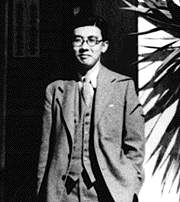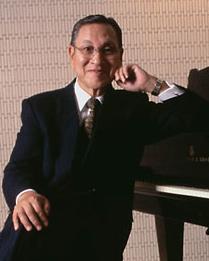
Akio Morita was a Japanese entrepreneur and co-founder of Sony along with Masaru Ibuka.

Sony Group Corporation, formerly known as Tokyo Tsushin Kogyo K.K. and Sony Corporation (ソニー株式会社), is a Japanese multinational conglomerate corporation headquartered in Minato, Tokyo, Japan. The Sony Group comprises entities such as Sony Corporation, Sony Semiconductor Solutions, Sony Entertainment, Sony Interactive Entertainment, Sony Financial Group, and others.
Olympus Corporation is a Japanese manufacturer of optics and reprography products. Olympus was established on 12 October 1919, initially specializing in microscopes and thermometers. Olympus holds roughly a 70 percent share of the global endoscope market, estimated to be worth approximately US$2.5 billion. Its global headquarters are located in Shinjuku, Tokyo, Japan.

Panasonic Holdings Corporation is a Japanese multinational electronics company, headquartered in Kadoma, Osaka, Japan. It was founded in 1918 as Matsushita Electric Housewares Manufacturing Works in Fukushima, Osaka by Kōnosuke Matsushita. In 1935, it was incorporated and renamed Matsushita Electric Industrial Co., Ltd. In 2008, it changed its name to Panasonic Corporation. In 2022, it became a holding company and was renamed.
VAIO is a brand of personal computers and consumer electronics, currently developed by Japanese manufacturer VAIO Corporation, headquartered in Azumino, Nagano Prefecture.

A transistor radio is a small portable radio receiver that uses transistor-based circuitry. Following the invention of the transistor in 1947—which revolutionized the field of consumer electronics by introducing small but powerful, convenient hand-held devices—the Regency TR-1 was released in 1954 becoming the first commercial transistor radio. The mass-market success of the smaller and cheaper Sony TR-63, released in 1957, led to the transistor radio becoming the most popular electronic communication device of the 1960s and 1970s. Transistor radios are still commonly used as car radios. Billions of transistor radios are estimated to have been sold worldwide between the 1950s and 2012.

Corning Incorporated is an American multinational technology company that specializes in specialty glass, ceramics, and related materials and technologies including advanced optics, primarily for industrial and scientific applications. The company was named Corning Glass Works until 1989. Corning divested its consumer product lines in 1998 by selling the Corning Consumer Products Company subsidiary to Borden.

Sanyo Electric Co., Ltd. is a Japanese electronics manufacturer founded in 1947 by Toshio Iue, the brother-in-law of Kōnosuke Matsushita, the founder of Panasonic. Iue left Matsushita Electric Industrial to start his own business, acquiring some of its equipment to produce bicycle generator lamps. In 1950, the company was established. Sanyo began to diversify in the 1960s, launching Japan's first spray-type washing machine in 1953. In the 2000s, it was known as one of the 3S along with Sony and Sharp. Sanyo also focused on solar cell and lithium battery businesses. In 1992, it developed the world's first hybrid solar cell, and in 2002, it had a 41% share of the global lithium-ion battery market. In its heyday in 2003, Sanyo had sales of about ¥2.5 trillion. However, it fell into a financial crisis as a result of its huge investment in the semiconductor business. In 2009, Sanyo was acquired by Panasonic, and in 2011, it was fully consolidated into Panasonic and its brand disappeared. The company still exists as a legal entity for the purpose of winding up its affairs.

Masaru Ibuka was a Japanese electronics industrialist and co-founder of Sony, along with Akio Morita.

Norio Ohga, otherwise spelled Norio Oga, was the former president and chairman of Sony Corporation, credited with spurring the development of the compact disc as a commercially viable audio format.
Made in Japan may refer to:

Nobuyuki Idei was a Japanese businessman. He was chairman and group chief executive officer of Sony Corporation until 7 March 2005. He was a director of General Motors, Baidu, Yoshimoto Kogyo and Nestlé.
"The Japan That Can Say No: Why Japan Will Be First Among Equals" is a 1989 essay originally co-authored by Shintaro Ishihara, the then Minister of Transport and a leading figure from the Liberal Democratic Party (LDP) who would become governor of Tokyo (1999-2012); and Sony co-founder and chairman Akio Morita, in the climate of Japan's economic rise. It was famous for its critical examination of United States business practices, and for advocating Japan's taking a more independent stance on many issues, from business to foreign affairs.

Sony Music Entertainment (Japan) Inc., often abbreviated as SMEJ or simply SME, and also known as Sony Music Japan for short, is a Japanese music arm for Sony. Founded in 1968 as CBS/Sony, SMEJ is directly owned by Sony Group Corporation and is operating independently from the United States-based Sony Music Entertainment due to its strength in the Japanese music industry. Its subsidiaries include the Japanese animation production enterprise, Aniplex, which was established in September 1995 as a joint-venture between Sony Music Entertainment Japan and Sony Pictures Entertainment Japan, but which in 2001 became a wholly owned subsidiary of Sony Music Entertainment Japan. It was prominent in the early to mid '90s producing and licensing music for animated series such as Roujin Z from acclaimed Japanese comic artist Katsuhiro Otomo and Capcom's Street Fighter animated series.
The phrase "Think globally, act locally" or "Think global, act local" has been used in various contexts, including planning, environment, education, mathematics, business and the church.
The TR-55, released in 1955, was both Japan's and Sony's first commercially available transistor radio. The use of transistors allowed the device to be much smaller than earlier vacuum tube radios.
The history of Sony, a Japanese multinational conglomerate, dates back to 1946.

Anaheim University is a private for-profit university based in Anaheim, California. It was founded in 1996 as the Newport Asia Pacific University.

Sony Canada is a wholly owned subsidiary of Sony Corporation, of Tokyo, Japan. Sony provides products that include Blu-ray players, BRAVIA televisions, Cyl digital cameras, Handycam Camcorders, VAIO computers, broadcast cameras, IPELA security cameras and video conferencing and many more products. Sony is an entertainment company that includes electronics, music, movies, games and online businesses. Sony Canada is headquartered in Toronto.
Taylor Sheridan is an American filmmaker and actor. Sheridan portrayed David Hale in the FX television series Sons of Anarchy and Danny Boyd in Veronica Mars (2005–2007).












